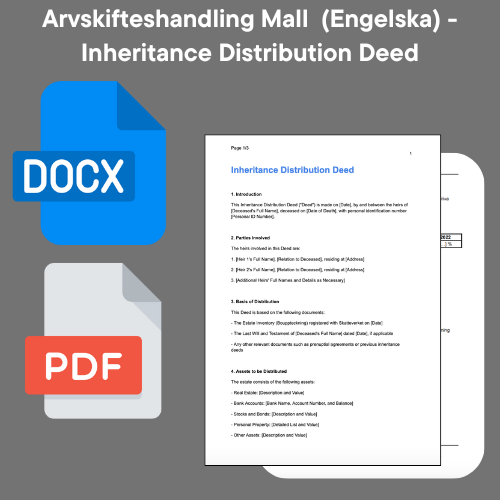Does Inheritance Become Private Property? A Complete Guide
Share
Understanding what happens to an inheritance in a separation or divorce is of the utmost importance to anyone facing a life-changing situation. Many people ask: "Does inheritance become private property?" The answer is more complicated than one might first think and depends on several different factors. In this article, we go through what applies to inheritance and individual property, what you need to think about and how you can protect your inheritance from being part of a future division of property.
Table of contents
- What Does Individual Property Mean?
- Inheritance as Individual Property
- The Significance of the Will
- If the Will is Missing
- Inheritance and Prenuptial agreement
- Create a Prenuptial Agreement
- Inheritance, Gifts and Personal Property
- What Happens If Property Is Mixed?
- Manage Confusion
- How to Protect your Legacy
- Advice and Legal Help
- Conclusion
What Does Individual Property Mean?
Separate property is assets that are not divided between spouses in a divorce. Unlike matrimonial property, which is divided equally between the spouses, a spouse retains his separate property as his own. This can include property acquired by inheritance, gift or prenuptial agreement. Having clarity on what is classified as individual property is therefore crucial to protecting one's assets.
Inheritance as Individual Property
A central question that many ask is whether inheritance automatically becomes private property. The answer is no – an inheritance does not automatically become individual property. In order for an inheritance to become private property, it is required that the deceased has expressly determined this in his will. If the will states that the inheritance shall be individual property, this means that the inheritor does not have to share the inheritance with his or her spouse in the event of a divorce.
The Significance of the Will
In order to ensure that the inheritance becomes private property, a will must therefore be drawn up. The will is a legal document where the deceased can specify that an inheritance should be separate property to protect it from future estate divisions. It is important that the will is clearly worded to avoid misunderstandings and legal disputes.
If the Will is Missing
If a will does not exist, and it does not explicitly state that the inheritance shall be individual property, the inheritance will be part of the matrimonial estate and may thus be divided in a divorce. This means that if you want to ensure that your inheritance remains private property, it is necessary to draw up a will.
Inheritance and Prenuptial agreement
In addition to a will, a prenuptial agreement can also be used to protect the inheritance as individual property. A prenuptial agreement is an agreement between spouses in which it is possible to agree that certain property, such as an inheritance, shall be separate property. This is especially important if you don't have a will but still want to protect your inheritance.
Create a Prenuptial Agreement
For a prenuptial agreement to be valid, it must be in writing and signed by both spouses. It must also be registered with the Swedish Tax Agency. It is important to bear in mind that a prenuptial agreement can be changed or annulled if both spouses agree to this.
Inheritance, Gifts and Personal Property
Gifts can also be made into private property if the donor explicitly states this in the gift deed. As with inheritance, it must be clearly stated that the gift must be separate property to avoid it being divided in the event of a divorce.
What Happens If Property Is Mixed?
It is also important to understand what happens if individual property is mixed with matrimonial property. For example, if a spouse uses separate property to buy something that becomes joint, it can be difficult to argue that it is still separate property. This is called commingling, and it can lead to the individual property being converted into matrimonial property.
Manage Confusion
To avoid your individual property losing its status, you should be careful to keep it separate from the matrimonial property. This may mean having separate bank accounts or clearly documenting what is separate property in connection with purchases.
How to Protect your Legacy
There are several ways to protect your inheritance from being part of a property division. First of all, you should make sure that there is a will that clearly states that the inheritance is to be single property. You can also consider drawing up a prenuptial agreement in which it is stated that the inheritance shall be separate property.
Advice and Legal Help
If you are unsure about how to go about protecting your inheritance, it is a good idea to seek legal advice. A lawyer can help you draw up the necessary documents and advise you on how best to protect your assets.
Conclusion
Inheritance does not automatically become personal property, but by making a will or prenuptial agreement you can ensure that your inheritance is protected. It is important to be aware of the legal aspects of inheritance and separate property to avoid future conflicts and protect your assets in the event of a divorce. If you need help creating these documents, consider using our document templates to ensure everything goes right from the start.


